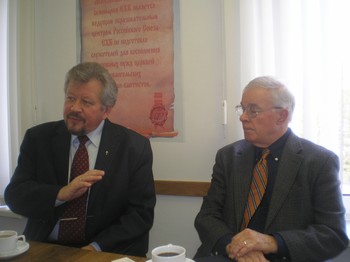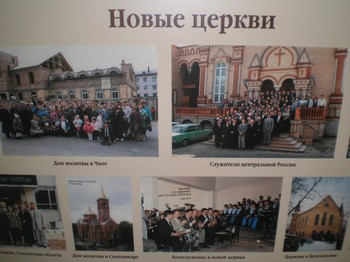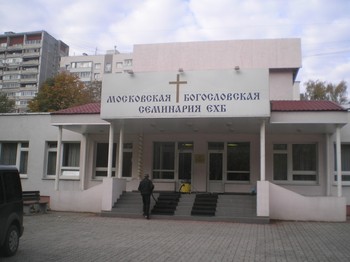On this October day, the halls of Moscow Theological Seminary (MTS) are bustling with students and pastors. Students are here for classes. Pastors from throughout Russia are holding their periodic gathering of the Union of Evangelical Christians-Baptists, a key partner church of the Presbyterian Church (U.S.A.).
“The story of our seminary really begins with the first evangelical mission to Russia in 1882,” says the Rev. Peter Mitskevich, president of the seminary. “Since then we have been through a lot, but thank God we are still here.”
At the first meeting of the Baptist World Congress in 1905 in London, Russian Baptists “asked for their own seminary,” Mitskevich says. They were authorized to run Christian education projects and did so for several years, primarily in St. Petersburg.
At the All-Russian Congress of Baptists in 1909, the leaders of the Baptist Union raised the possibility of beginning a theological seminary in Moscow, but the twin threats of world war and the Bolshevik revolution intervened before they could raise the money for it.
“We were subject to two great persecutions: first the tsars and then Stalin,” Mitskevich says.
Christian education courses continued under Lenin but after his death in 1923, things steadily got worse for Christians in Russia. By 1930 Stalin had outlawed all Christian education activities ― a ban that persisted for 40 years.
At the height of Stalin’s “purges” in the late 1930s the Baptist Union was reduced to four churches. But the church held on.
“There has been rapid growth since perestroika, with a focus on evangelism and church planting,” says Mitskevich.
That reorganization of the Soviet economy and bureaucracy in the mid-1980s was accompanied by a more relaxed attitude by the state toward organized religion.

Peter Mitskevich (left), president of Moscow Theological Seminary, and Ian Chapman, chair of the seminary’s trustees discuss the growth of the seminary and of the church in Russia. —Jerry L. Van Marter
With the collapse of the Soviet Union in 1991, the world opened up for Russians, including Russian Baptists. A group of American Baptists ― from the American Baptist Churches denomination ― visited in 1992, led by seminary president Ian Chapman.
Now “retired,” Chapman is president of Russian Leadership Ministries, which provides financial and other support to MTS and other Christian education endeavors in Russia.
“During perestroika thousands of religious groups poured into Russia,” Chapman, still possessed of a brogue of his native Scotland, says. “But the Russian Baptists told us, ‘Our own family has abandoned us.’”
Chapman’s group went to work and in 1993 MTS opened its doors. Now, nearly 20 years later, the seminary has 2,000 students studying at the main campus here and in nine or 10 satellite campuses around the country.
The most common program involves two two-week sessions per year for five years, leading to an M.Div. degree. “We tried a full-blown full-time residential program but it failed,” says the undaunted Chapman.
A few classes are taught on a short-term basis by Western academics, Chapman says, “but MTS is not interested in importing Western denominationalism.”

A photo exhibit at Moscow Theological Seminary of some of the new Protestant churches that have been planted in recent years in Russia. —Jerry L. Van Marter
Though no longer oppressed by state control, MTS still operates in a very difficult environment.
“There’s a whole bunch of stuff going on that is causing decline in Russia and the church ,” says Chapman, who chairs one board that oversees the seminary (the other is composed entirely of Russians). “There is a brain drain out of Russia, terrible health issues — particularly alcoholism — and a lack of leadership skilled in planning and process. Leadership is critical in this environment.”
But MTS continues to thrive. “We’re grateful to the Lord because we’re not smart enough given the horrendous challenges,” Chapman says. Plans are underway to expand the Moscow campus to include a conference center with lodging for 100 people and a new dining hall and kitchen.
Most important are plans for a “museum of remembrance.” There is, Chapman says, “an amazing history of faith and commitment here that must be recognized and honored.”

